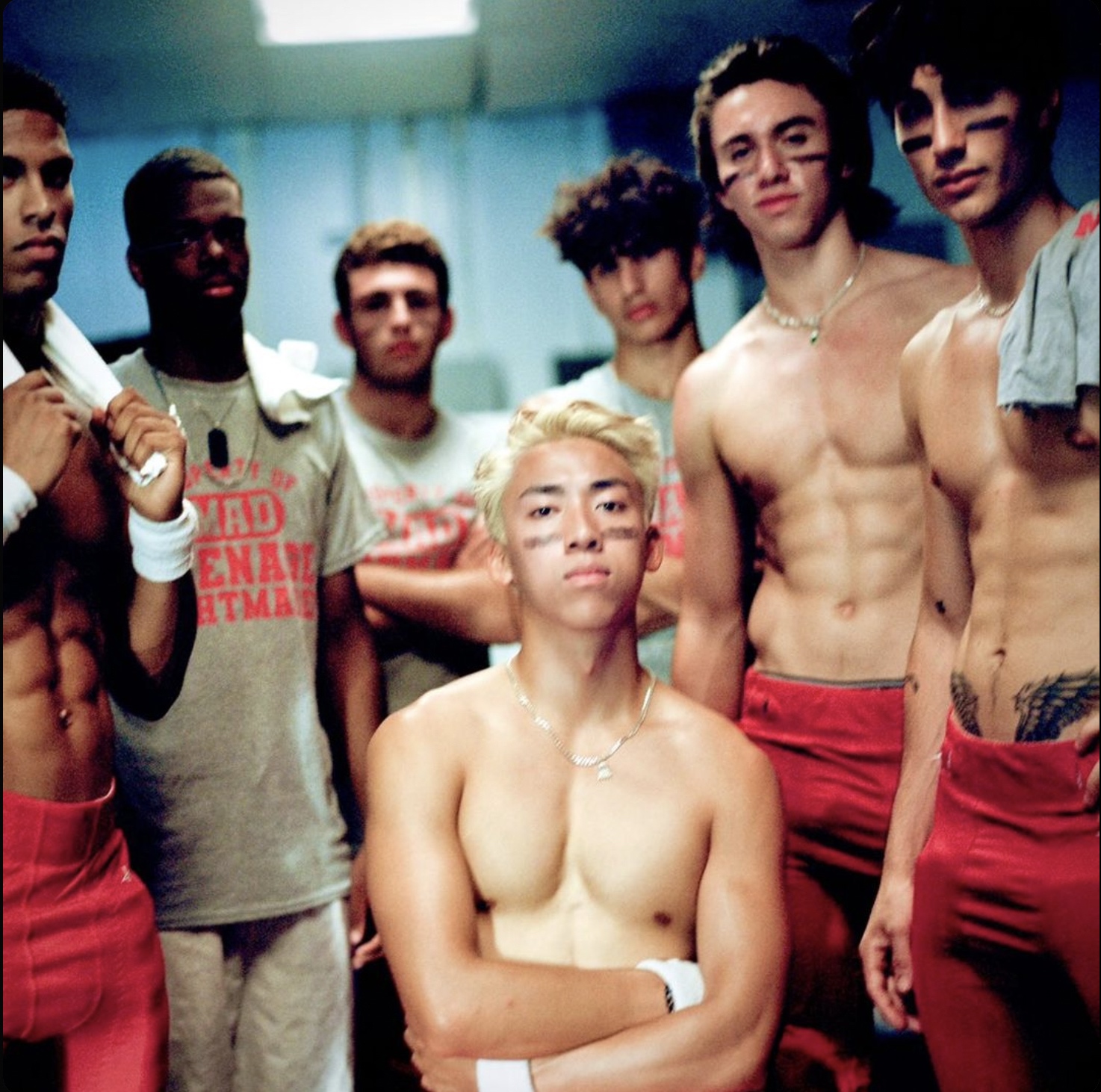Photo by Sam Lee
Jonathan Tsai, a.k.a. Mad Tsai, never really expected fame.
Tsai started his career as a bedroom pop artist posting music online, locked in his home during a worldwide pandemic with his ukulele and overwhelming emotions to work through. While he had a significant fanbase before the pandemic, Tsai’s audience dramatically increased during lockdown when TikTok surged in popularity. His first hit, “Boy Bi,” has over 19 million streams on Spotify, and the music video on YouTube has over 1.9 million views.
“Boy Bi” is a bright and poppy ballad in which Mad Tsai discusses coming to terms with his bisexuality. With a music video that mirrors a “High School Musical”-esque Disney show, the singer grapples with crushes on the football player and the girl next door to upbeat drums and ukulele strums.
Mad Tsai’s sound took a turn after “Boy Bi,” evident in his 2021 single “killer queen” which has almost 50 million streams on Spotify. “killer queen” never slows its pace or intensity, immediately opening with a dramatic wall of sound complete with an electric guitar solo climax at the bridge. This change doesn’t stop there; more than half of the songs on Mad Tsai’s first EP, “homecoming!”, have a full, fleshed out sound even in their calmest moments.
This transition from DIY bedroom pop artist to superstar seems to signal an intentional shift in Tsai’s music, and as a result, his image — something that we now see in his latest release: the full studio version of the single “stacy’s brother” and its accompanying music video.
I had a conversation with Mad Tsai on new releases, his writing process, and what being a queer musician means to him.
Jennifer Collier: First off, just to make sure I have the timeline right on “stacy’s brother” specifically, it was a demo, or it was an idea you were pitching in 2021, and then it started blowing up recently, so you were like, “Ooh, we can make this into a full fledged song and video.” What was the timeline on “stacy’s brother”?
Mad Tsai: So originally, I wrote [“stacy’s brother”] about falling in love with my best friend’s brother… I was like, “Wait, there’s literally a song called ‘Stacy’s Mom,’ so it’d pay homage to that without actually taking anything from the original source material… I wrote the song, and I forget what the girl’s name was honestly… but I changed it to Stacy afterwards because I wanted to be a little tongue-in-cheek with it.
I remember I was taking a shower, then I had this idea of this melody, and then I literally hopped out the shower [and] the same night I wrote the song on my ukulele. I posted it and then it went viral. I don’t even know how many views and likes it has at this point, I completely lost track. … Afterwards, I surprisingly had the song ready to go on [the EP]. I had the intent of releasing this with my first EP but then I realized that it would be more fitting for my second EP, so I actually had [the studio version] sitting in development for about a year, like it’s just been something that’s been sitting in my drafts.
I think it’s good that I waited this long, though, because the original demos were very different in comparison to what we had in the final studio version… I went back and I listened to them after a couple of months and I was like, “I think it seems like a good take.” So then I rewrote parts of the bridge and I wrote guitar solo parts that I wanted to add in, like crazy ass stuff. I just wanted the song to be really, really big and grand and to really really kick off this second EP. I think “stacy’s brother” is such an attention-grabbing song that I just had to make it the lead single.
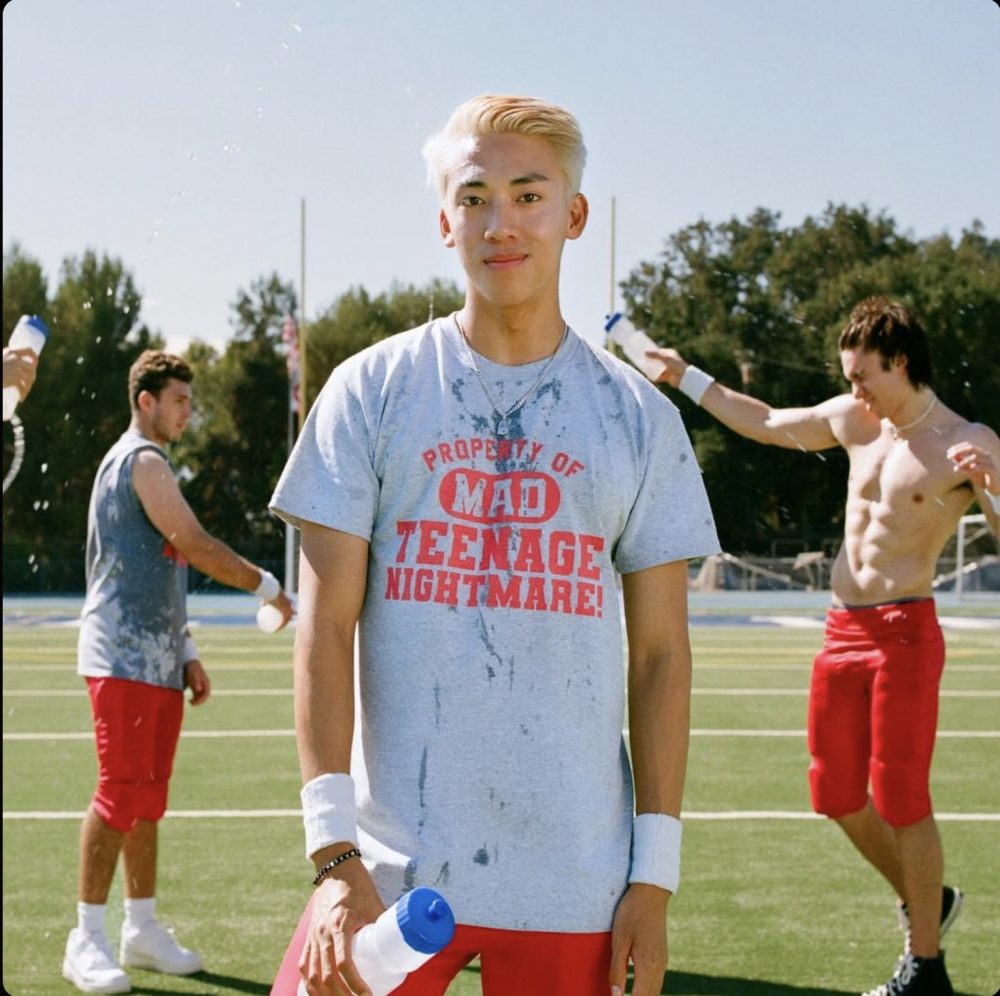
JC: Yeah it is, especially because it pays homage to “Stacy’s Mom,” which everyone knows, so the automatic assumption is like, “Is this song going to almost measure up to that?” It does grab people. I’ve seen the clips and photos you teased of the music video. Was that also something you were sitting on?
MT: The minute I wrote the song was when I wrote the [music video]. I had the [blueprint] for the music video for over a year… I had to mull it over because it was just so apparent to me that this had to be the lead single and had to have a big visual accompaniment.
I remember the minute I finished the song, I wrote it all down in a Google doc and I sent it over to my manager and … I feel a sense of dread that my manager will be like, “Oh my god, this is gonna be such a big budget video, holy shit,” which is honestly a fair concern. I like to think very big, and obviously the original idea that I had a year ago is not the same thing.
JC: I meant to ask you — I have been following your music since 2019.
MT: Oh wow, that’s a really long time!
JC: Yeah! I found you during my freshman year because…my friend was like, “You should check out this artist, he has a couple cool things,” and then I found you and I was like, “Oh, this is good shit!”
MT: Oh my gosh, you were probably there for the OG OG demos that I took off Spotify. They’re scrapped, but they were cute! They’re on SoundCloud, I think.
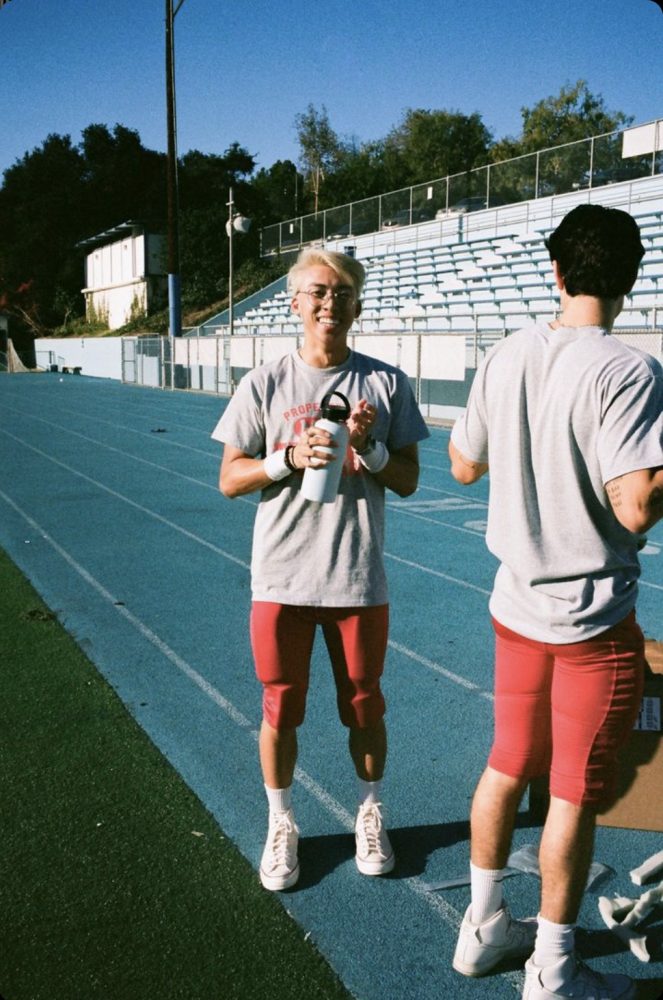
JC: I have to do some digging and find those again. I noticed that there was a sort of theme of high school for the first EP, and I was wondering, was there a reason for that, or did you just accidentally find yourself there?
MT: I think it was kind of the opposite. I really struggled to find myself in high school. I didn’t really have a great high school experience — I could write a whole book to attest to that — I genuinely didn’t have a lot of friends; I didn’t really do much besides just school. I was president of a club, I was in the varsity tennis team, I was in advanced choirs. All my classes were honors or AP. I just had an enormous stress ball of expectations that I never really sat down and thought about what I really wanted to do with my life.
It was just about appeasing to this expectation that I could not live up to, and by the time I got out of high school, I had no sense of identity because I was just like, “What the fuck did I do with my life?” I just wasted it on these little numbers that didn’t really mean anything, these letter grades that didn’t even hold any value once I moved on.
I think that’s why I have a cynical view of school in a way just because my coming of age was never there and I think I lived vicariously through watching coming of age movies, like “The Perks of Being a Wallflower,” “The Edge of Seventeen”; I would religiously watch these teen movies because even though some of them were really cheesy, it just offered a little bit of escapism, like “I can piece together [a narrative], I relate a little bit to this character and I relate a little bit to this story,” because my movie just doesn’t look anything like that. I grew up in a really boring suburban town where nothing really happened, and I was trying to make stuff happen, just in my head. I think the first EP set up that story of me trying to figure out who I am as a person.
I’m the most proud of all the songs that I’ve written for the second EP because I think this is where I start coming into my own as an artist, but also, I come to terms with the fact that I have a void in my life that I am trying to fill and by doing that, you don’t really know what’s real and what’s not. I fill this void of my youth by trying to fill it up with these narratives that I’ve written up or things that I’ve made up in my mind. like “stacy’s brother.”
Everyone always asks me if that’s a true story, and it’s 100% not a true story. I mean, there is some weird stuff that happened to me in high school and there’s people that hit me up after high school, after I posted “stacy’s brother” that asked, “Wait, is this about blank or is this about blank?” and I’m just like, “Oh God, no!” Or they’ll ask, “Oh my God did this actually happen?” I think that’s the whole point of the second EP in just setting up who I am as an artist.
I don’t want the fans to speculate about my personal life because I honestly don’t like really getting into my personal life that often. I would like to keep this sense of anonymity, but I think I like doing that by trying to write songs that are either about me or about someone else, or things that are either fact or fiction and they [the listeners] just can’t tell which one which one is which.
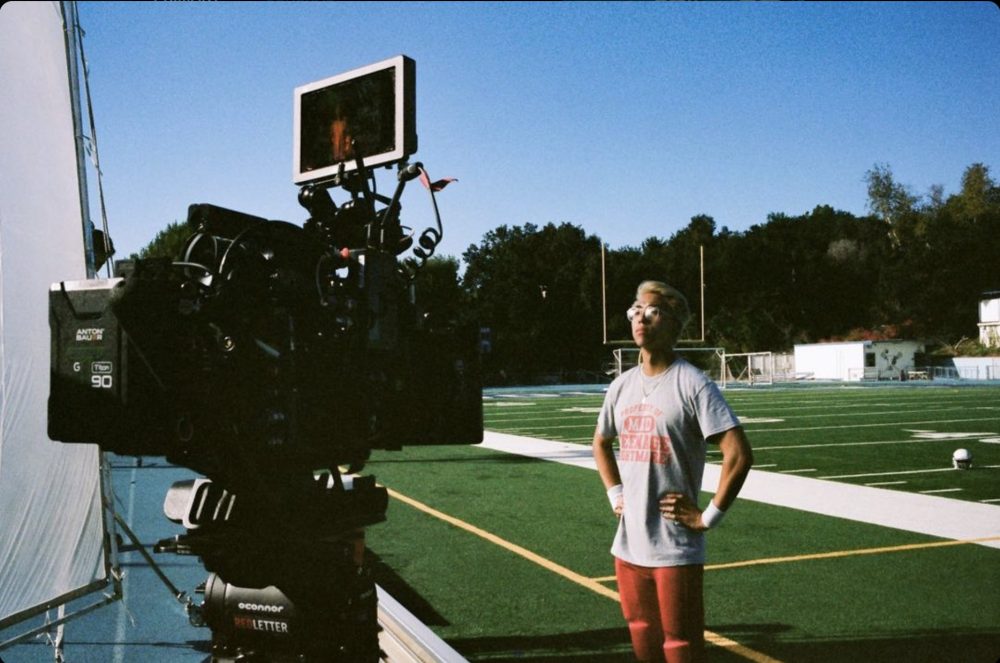
JC: It’s difficult to draw the line on platforms like TikTok, specifically of how much you share about yourself.
MT: I think I definitely learned that boundary after I posted “Boy Bi” because then I started having people pry into my personal life, and I was literally a sophomore in college at home in my bedroom just trying to figure shit out. People were trying to pry into my personal life and into who I am, where I grew up, what’s my hometown, what’s my high school, and all these different things, and I wasn’t prepared for that. People will pry because I think they have this weird sense of entitlement these days to know everything about people on the Internet that they don’t actually know in real life.
JC: When I found you in 2019, you had a following … then when the pandemic hit, “Boy Bi,” everything exploded. What was going viral like for you?
MT: This is going to sound really depressing, but I think it was really detrimental for my mental health, I’m not going to sugarcoat it. I think being a teenager and going viral was this weird experience that I genuinely wouldn’t wish upon a lot of people because it’s a really negative experience where you start to associate your self worth with a number and I get caught up in these little cycles where I do this, and I’ve gotten a lot better at breaking myself out of them.
A lot of other people and artists that I’ve talked to have kind of had the same thoughts. I think the music industry is so oriented around TikTok these days, which I personally have a vendetta against, which is ironic coming from me, but I think you start to grow a little bit of cynicism about TikTok and throw yourself to the whims of an algorithm that doesn’t really see you as a person.
I’m obviously condensing it to the bare bones of it all. I think that has made me a little bit more wary about what I post, but I’m also really, really grateful for where it’s gotten to me and the people that I’ve met and the fans that I’ve connected with, because I wouldn’t be doing what I do unless I had done those things. So it is kind of a Catch-22; it is the road that I’ve taken but also at the same time, now I can forge my path and hopefully move on as an artist, having done those foundations.
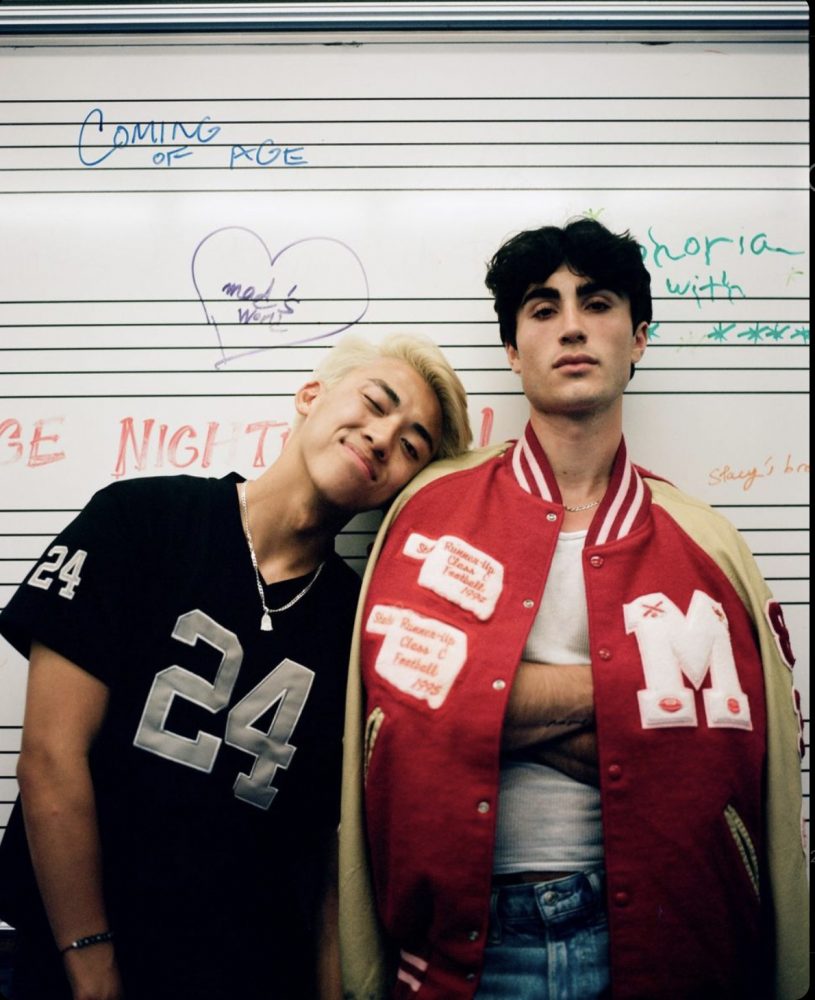
JC: What role does your identity as a queer person play in your songwriting? Especially with pieces like “stacy’s brother,” I think some queer artists aim to have ambiguity in their music when they’re not as ready to come out directly, so having something that’s very specifically about a boy being attracted to a boy where there’s no way to misconstrue it… What did taking that kind of stance feel like?
MT: I purposely made [“stacy’s brother”] to be the lead single because it was so direct and so in-your-face, I think in the same way that “Boy Bi” was. Those are two completely different songs… I think the progression from “Boy Bi” into “stacy’s brother” is a weird shock to some people because the minute I released “Boy Bi,” people thought I was going to stay in this cutesy, ukulele, singer-songwriter lane. But I think “stacy’s brother” is what establishes me as not only a songwriter, but also a pop artist.
I think the common thread [between these two songs] is that they’re … so unapologetic about what they’re about that I think you just can’t help but look. You have to look at what’s happening, and I think that was the goal of “Boy Bi”… It meant a lot for young people growing up that there is no subtext for it, and it is cut and dry … and it’s just, “I’m bi, I’m who I am as a person, deal with it.”
JC: Was there ever a moment of hesitation when you started to worry about [direct portrayals of your sexuality] hindering your image?
MT: Yes. 100%. I definitely went on a little deep dive on the Internet a while ago and I just remember I went on a music critic site, and people were trashing “Boy Bi” because the lyrics were so direct, and they’re calling it cringy and cheesy. I do acknowledge some of the lyrics are very direct, and that was just the songwriting but … I knew that the song was something that was important for me, and it was something that I wrote for myself and for other people. I didn’t really care in that moment, and although I do have some worry sometimes, I do appreciate where this whole road has gotten me. I probably wouldn’t be doing a lot of things and I’d be a much smaller artist had I not made “Boy Bi” or had I not done “killer queen” or things like that. I think I just had to take a leap of faith and I don’t regret what I did.
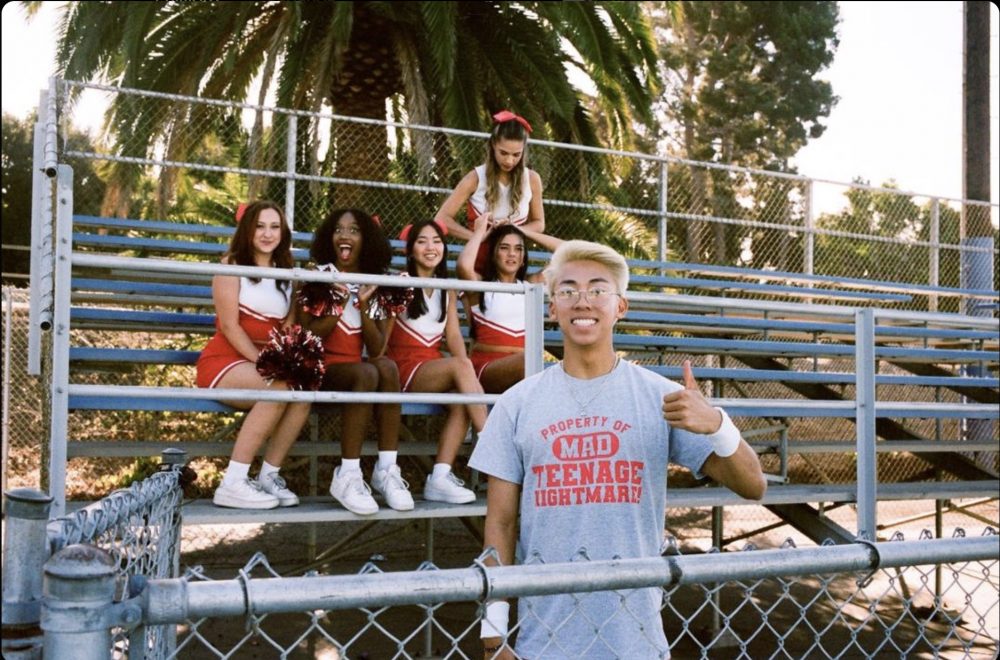
JC: What was the process of recording and producing “stacy’s brother” and was it different from any other project? How did you go about it?
MT: For “stacy’s brother,” it was the first song that I worked on with my main producer, Drew. I remember going into a studio with him for the first time, and I was like, “I have this song that I wrote, and it’s kind of weird, it’s kind of outlandish, but I kind of want to just put it on the table and see what happens.” I remember I had my little ukulele — I didn’t have my electric uke at the time. I just had my normal $100 one that I had since high school — and I remember I just played the chords and I sang what I sang and he started adding a beat to it and we just started getting experimental with it. He was just throwing stuff at the wall, adding electric guitar and adding this and that and a bass line and all these other things.
I think that was the moment where I realized I really, really liked him as a producer because he wasn’t afraid to throw things at the wall, experiment and really just try out anything. So I think working with Drew has been a really, really great experience. I did the whole EP with him.
I think one of the things about the first EP, which was a growing pain as an artist, was all the songs on the EP were produced by completely different producers. I was the only common thread amongst all the songs, so I was trying to co-produce and trying to make sure that all the songs sounded cohesive, and it was very, very difficult for me because I was being stretched so thin when all these different producers wanted to do different things. [Drew gave] me the chance to just sit down and make sure that everything flows continuously, and [the second] EP is a body of work that I’m super proud of and I’m really really excited for it to come out.
JC: Who is your biggest music inspiration?
MT: Lorde has always been an inspiration for me; she’s an artist that I’ve always looked up to. I think “Melodrama” is just this weird pinnacle of pop where it’s just so cohesive in the writing and the production, like you could tell so much thought was put into this album. It’s kind of insane to look at it because the songs have aged so well, and it’s been like five or six years since she’s released it, and I still listen to all the songs religiously, and I haven’t gotten tired of them even after five years. Like that’s something you can’t say for a lot of albums. Also, this was something that I listened to when I was in high school, it was very formative for me. I think that’s always the goal to make an album that is so cohesive and tells a story and the production is so well thought out, and I think that has always been my goal, and it still is my goal, so for any projects moving forward, it doesn’t matter how long the road takes. I want to make sure that it sounds good and it’s something that represents me.
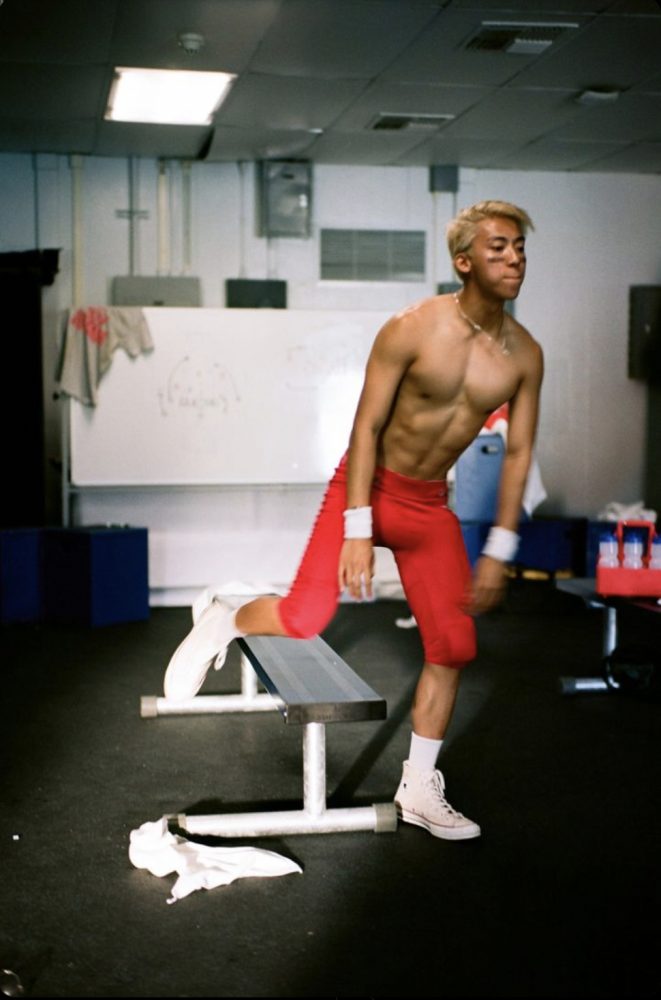
JC: What are your next steps?
MT: I had virtually all the songs on the second EP planned out before my first EP, and I had the first EP planned out like a year before I released [it], so I am a person that likes to make lists and plan in advance, and I like dropping little Easter eggs in all my videos. There is an Easter egg for “stacy’s brother” in “killer queen,” and there are also Easter eggs in what the EP is called. I don’t think anyone caught on to what it was… I also teased some stuff out when I was on tour. I played some of the next songs from the EP but also I was hiding little Easter eggs in the outfits that I was wearing.
I’m excited for this project, it’s something that, like, I’ve dreamed of. I think the first EP is where I felt like a person that put out songs but I didn’t really feel like an artist, but I think with the second EP, I’m starting to feel like a person that actually makes music and makes projects that I’m really proud of. It’s a feeling that I can’t wait to fully experience once I have all the songs and videos out, and I could build a world around it. I like to think big, and I want to build a world around this next EP, and I have hinted that in “homecoming!”, but the second EP is where I think you’re going to see a lot more of this narrative.
Listen to Mad Tsai’s music on Spotify and YouTube, check out his website, and follow him on Instagram and TikTok (@madsteaparty).
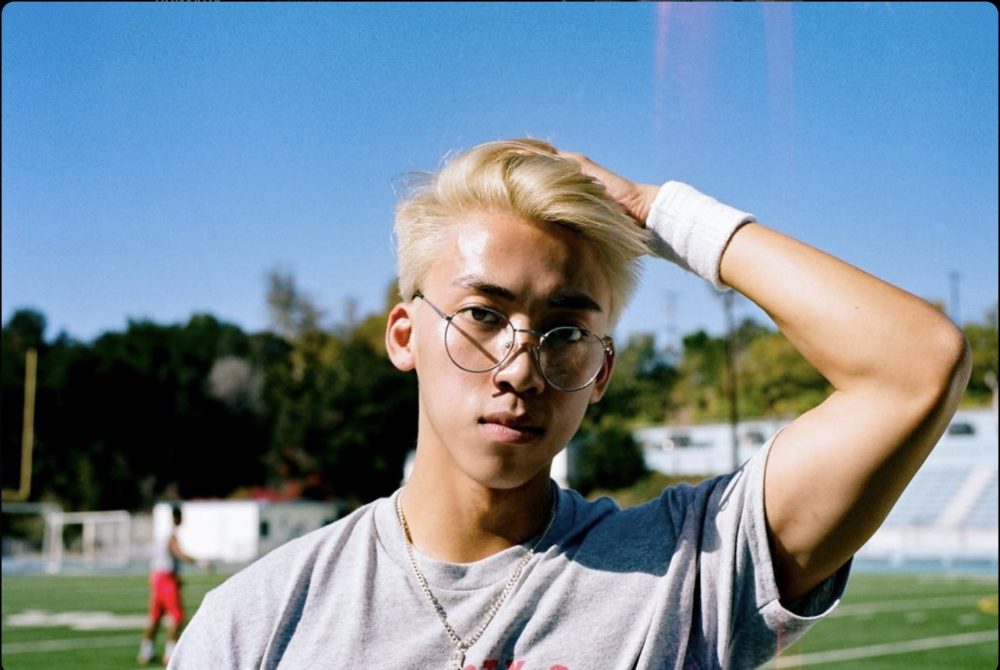
Credits:
Author: Jennifer Collier (She/They)
Copy Editors: Bellze (They/Xey), Bella (She/They)

